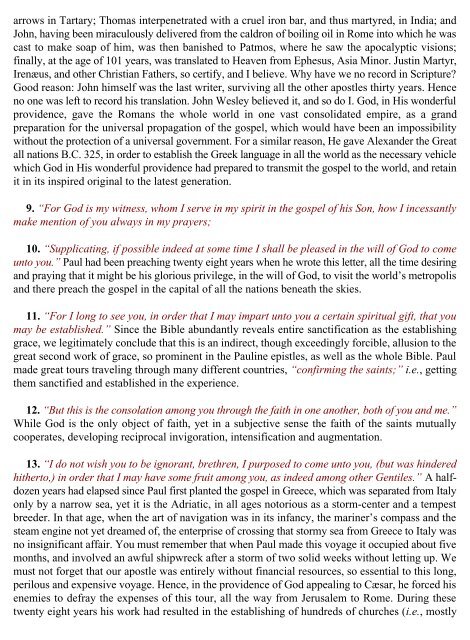Godbey's Commentary - Acts - Romans - Enter His Rest
Godbey's Commentary - Acts - Romans - Enter His Rest
Godbey's Commentary - Acts - Romans - Enter His Rest
You also want an ePaper? Increase the reach of your titles
YUMPU automatically turns print PDFs into web optimized ePapers that Google loves.
arrows in Tartary; Thomas interpenetrated with a cruel iron bar, and thus martyred, in India; and<br />
John, having been miraculously delivered from the caldron of boiling oil in Rome into which he was<br />
cast to make soap of him, was then banished to Patmos, where he saw the apocalyptic visions;<br />
finally, at the age of 101 years, was translated to Heaven from Ephesus, Asia Minor. Justin Martyr,<br />
Irenæus, and other Christian Fathers, so certify, and I believe. Why have we no record in Scripture?<br />
Good reason: John himself was the last writer, surviving all the other apostles thirty years. Hence<br />
no one was left to record his translation. John Wesley believed it, and so do I. God, in <strong>His</strong> wonderful<br />
providence, gave the <strong>Romans</strong> the whole world in one vast consolidated empire, as a grand<br />
preparation for the universal propagation of the gospel, which would have been an impossibility<br />
without the protection of a universal government. For a similar reason, He gave Alexander the Great<br />
all nations B.C. 325, in order to establish the Greek language in all the world as the necessary vehicle<br />
which God in <strong>His</strong> wonderful providence had prepared to transmit the gospel to the world, and retain<br />
it in its inspired original to the latest generation.<br />
9. “For God is my witness, whom I serve in my spirit in the gospel of his Son, how I incessantly<br />
make mention of you always in my prayers;<br />
10. “Supplicating, if possible indeed at some time I shall be pleased in the will of God to come<br />
unto you.” Paul had been preaching twenty eight years when he wrote this letter, all the time desiring<br />
and praying that it might be his glorious privilege, in the will of God, to visit the world’s metropolis<br />
and there preach the gospel in the capital of all the nations beneath the skies.<br />
11. “For I long to see you, in order that I may impart unto you a certain spiritual gift, that you<br />
may be established.” Since the Bible abundantly reveals entire sanctification as the establishing<br />
grace, we legitimately conclude that this is an indirect, though exceedingly forcible, allusion to the<br />
great second work of grace, so prominent in the Pauline epistles, as well as the whole Bible. Paul<br />
made great tours traveling through many different countries, “confirming the saints;” i.e., getting<br />
them sanctified and established in the experience.<br />
12. “But this is the consolation among you through the faith in one another, both of you and me.”<br />
While God is the only object of faith, yet in a subjective sense the faith of the saints mutually<br />
cooperates, developing reciprocal invigoration, intensification and augmentation.<br />
13. “I do not wish you to be ignorant, brethren, I purposed to come unto you, (but was hindered<br />
hitherto,) in order that I may have some fruit among you, as indeed among other Gentiles.” A halfdozen<br />
years had elapsed since Paul first planted the gospel in Greece, which was separated from Italy<br />
only by a narrow sea, yet it is the Adriatic, in all ages notorious as a storm-center and a tempest<br />
breeder. In that age, when the art of navigation was in its infancy, the mariner’s compass and the<br />
steam engine not yet dreamed of, the enterprise of crossing that stormy sea from Greece to Italy was<br />
no insignificant affair. You must remember that when Paul made this voyage it occupied about five<br />
months, and involved an awful shipwreck after a storm of two solid weeks without letting up. We<br />
must not forget that our apostle was entirely without financial resources, so essential to this long,<br />
perilous and expensive voyage. Hence, in the providence of God appealing to Cæsar, he forced his<br />
enemies to defray the expenses of this tour, all the way from Jerusalem to Rome. During these<br />
twenty eight years his work had resulted in the establishing of hundreds of churches (i.e., mostly
















